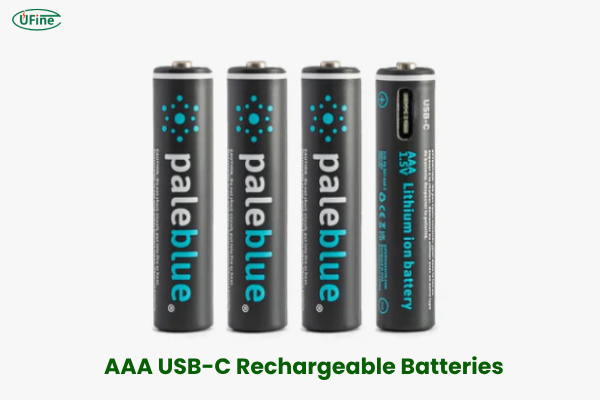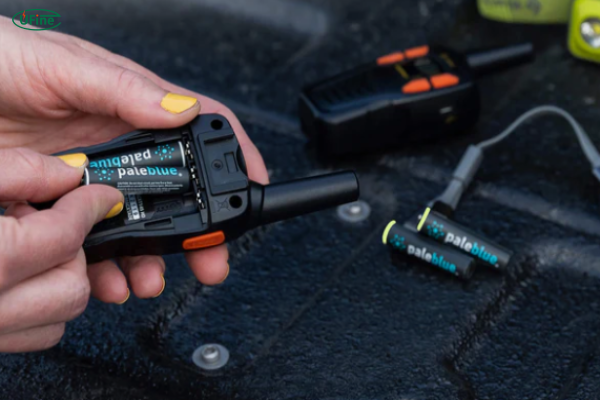Part 1. Understand lithium AAA battery
Lithium AAA batteries may seem like just another type of battery. But once you understand how they work and what they offer, it’s easy to see why they’re considered a step above traditional alkaline cells.
These batteries use lithium chemistry, typically lithium iron disulfide (Li-FeS₂), giving them a longer lifespan, higher energy density, and better performance in extreme temperatures. If you’ve ever had a device stop working too soon, it’s probably because it was using a cheaper battery that couldn’t keep up.
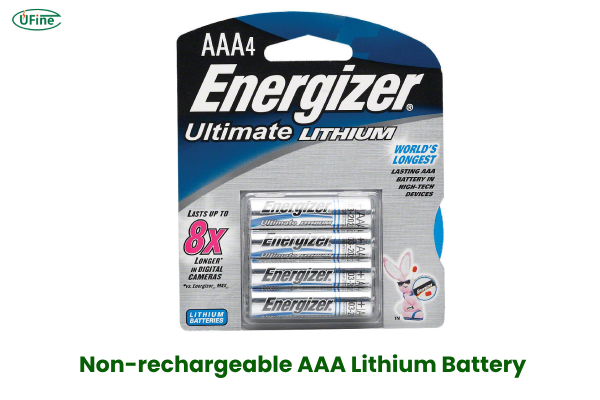
The lithium AAA battery is ideal for high-drain devices such as cameras, wireless keyboards, medical instruments, and smart remotes. It’s also perfect for emergency kits, thanks to its long shelf life—up to 20 years in some cases.
And let’s be honest—nothing’s more annoying than a remote or flashlight dying when you need it most. That’s why switching to lithium just makes sense.
Part 2. Weight
You might not think weight matters for batteries this small—but it does. A typical lithium AAA battery weight ranges from 7.6 to 8 grams, while an alkaline AAA battery usually weighs around 11.5 grams.
That’s a 30% weight reduction.
Why does it matter? Well, if you’re loading a headlamp or carrying spares for a long hike, every gram counts. Lightweight batteries reduce the burden on your gear, especially when you’re carrying multiples.
Moreover, in sensitive devices like drones or wearable medical tools, a lighter battery helps maintain balance, efficiency, and comfort.
Part 3. Size
In terms of dimensions, lithium AAA batteries follow standard AAA sizing: approximately 44.5 mm in length and 10.5 mm in diameter.
That means they’re physically compatible with any device designed for AAA batteries. No adjustments or special enclosures are needed. So, switching to lithium is seamless. Just swap them in, and you’re good to go.
However, due to their lighter material composition, some lithium batteries may feel slightly different to the touch—but the size remains universally standard.
Part 4. Voltage
Voltage plays a huge role in how your device performs.
A typical lithium AAA battery voltage is 1.5 volts. What sets lithium apart is that this voltage stays consistently high during discharge. Alkaline batteries, in contrast, start strong but drop voltage quickly, which can cause your device to malfunction or shut off prematurely.
In devices that require a steady power input—like medical thermometers, wireless mouses, or LED lights—voltage stability is everything. A drop can mean flickering lights or inaccurate readings.
With a 1.5V lithium AAA battery, you get smooth, reliable performance for longer. And yes, your gadgets will thank you for it.
Understanding AAA Battery Voltages in Simple Terms
Part 5. Capacity
Now let’s talk power. Battery capacity, measured in milliamp-hours (mAh), tells you how long the battery can power a device before it’s drained.
A good lithium AAA battery capacity is typically between 1100 to 1200 mAh, which is significantly more than the 850 to 1000 mAh you’d get from a standard alkaline.
In real-world terms, that means you’ll get more photos from your camera, longer life from your wireless mouse, and fewer battery swaps overall. For high-drain devices, this extra power is more than just convenient—it’s essential.
Enerything You Should Know About Li-ion Battery Capacity
Part 6. Is there a lithium polymer AAA battery?
This question comes up often. Lithium polymer (Li-Po) batteries are indeed real and are used in a wide range of electronics—but they are rarely available in AAA format.
Li-Po batteries are typically custom-shaped and found in smartphones, drones, and other compact gadgets. They offer lightweight design and flexible form factors, but they usually require battery management systems and don’t follow standard sizing.
So while lithium polymer AAA batteries exist in very niche markets, they’re not mainstream. For most AAA needs, lithium iron disulfide or lithium-ion batteries are what you’ll find.
Part 7. Is the lithium AAA battery rechargeable?
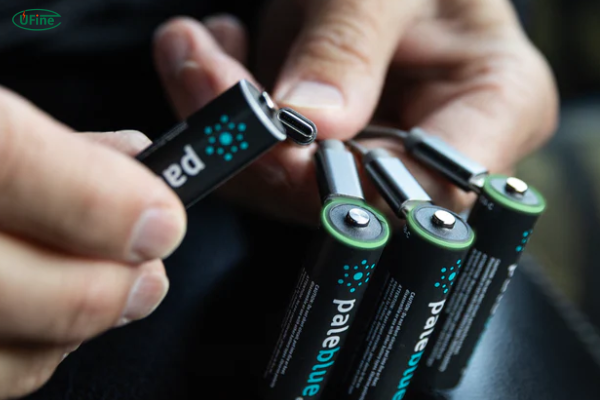
This is where it gets interesting.
Not all lithium AAA batteries are rechargeable. In fact, the majority—like the popular L92 lithium AAA battery from Energizer—are single-use.
However, there are rechargeable lithium AAA batteries available. These usually operate using lithium-ion chemistry and provide thousands of recharge cycles. Just make sure you pair them with a lithium AAA battery charger that’s compatible.
Rechargeables are a smart investment if you go through batteries quickly. Yes, they cost more upfront, but they can pay off in just a few months. They’re also better for the planet. Fewer disposables = less waste.
But be careful: never try to recharge a non-rechargeable lithium battery. It’s dangerous and could lead to overheating or leakage.
Part 8. Lithium AAA battery charger
Lithium batteries charge differently from traditional types. They need precise voltage and current control to prevent overcharging, overheating, or reduced battery lifespan. That’s why most lithium AAA battery chargers include:
- Smart charging circuits
- Automatic cut-off when full
- Overcharge and short-circuit protection
- LED indicators for charge status
- USB or USB-C inputs for flexible charging anywhere
Some advanced chargers can even recondition or balance cells, extending their usable life.
Top Picks for Lithium AAA Battery Chargers
Here are a few reliable chargers made specifically for lithium AAA batteries:
- EBL Smart Lithium Charger
- Works with 1.5V rechargeable lithium AAA and AA batteries. Features individual charging channels and smart protection.
- Tenavolts USB Charger
- Specifically designed for Tenavolts lithium batteries. Offers constant voltage charging and great portability.
- XTAR VC4 Charger
- A more advanced, universal charger that supports lithium-ion, NiMH, and other battery chemistries. Great for users who have multiple battery types.
Can I Use a Regular NiMH Charger?
No, and this is very important.
Do not use a NiMH charger for lithium batteries unless it explicitly says it supports lithium-ion cells. NiMH chargers operate at lower voltages and lack the precision needed to safely charge lithium batteries. It’s like trying to fill a high-pressure tire with a hand pump—not only ineffective but potentially dangerous.
A Few Charging Tips
- Always monitor the first few charge cycles of new batteries.
- Use the recommended charger from the battery brand if possible.
- Unplug once fully charged to preserve battery health (unless the charger has auto shut-off).
- Store batteries and chargers in a cool, dry place.
Part 9. Price
Let’s talk money.
Yes, lithium AAA batteries cost more—usually between $1.50 to $2.50 per battery, compared to less than $1 for alkaline. Rechargeables can run higher, but they last for hundreds (even thousands) of cycles.
Here’s the thing: you get what you pay for.
With lithium, you’ll:
- Replace batteries less often
- Get better device performance
- Enjoy longer shelf life
- Avoid messy leaks
So while the initial cost is higher, the long-term savings and convenience make it worthwhile—especially for mission-critical devices or frequently used electronics.
Part 10. Best lithium AAA battery
If you’re looking for the best AAA lithium batteries, here are some trusted names:
1. Energizer Ultimate Lithium L92
-
1100–1200 mAh, 1.5V
-
Excellent in extreme temps (-40°F to 140°F)
-
Industry gold standard
-
Up to 20-year shelf life
2. EBL Rechargeable Lithium AAA Batteries
-
Rechargeable via USB
-
Constant 1.5V output
-
Good for daily-use gadgets
-
Eco-friendly
3. Tenavolts 1.5V Rechargeable Lithium Batteries
- Stable voltage across discharge cycle
- Comes with smart charger
- High performance and reusable
These are great for everything from smart home devices to emergency gear. Choose based on whether you want rechargeables or single-use batteries—and how often you’ll use them.
Part 11. What is the longest-lasting AAA lithium battery?
In most tests and reviews, the Energizer Ultimate Lithium L92 consistently comes out on top. It’s designed to last up to 9x longer in digital cameras than regular alkaline batteries.
Its secret? High energy density, stable voltage, and unmatched durability—even in harsh weather.
If you’re preparing an emergency kit, heading into the outdoors, or just want the best of the best, this is the battery to get.
Part 12. FAQs
Can I mix lithium and alkaline batteries in the same device?
No. Mixing battery types can cause leakage, poor performance, or even damage your device.
Are lithium AAA batteries safe?
Yes, when used properly. They are leak-proof and reliable, but never try to recharge non-rechargeable versions.
What devices benefit most from lithium AAA batteries?
High-drain electronics like cameras, LED lights, digital thermometers, GPS units, and wireless gadgets.
How long can lithium AAA batteries be stored?
Up to 20 years depending on the brand and storage conditions.
Can lithium batteries leak like alkaline ones?
It’s much less likely. Lithium batteries are more stable and leak-resistant—even in storage.
Related Tags:
More Articles
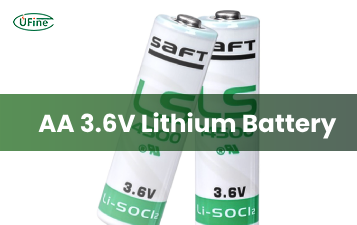
What You Need to Know About AA 3.6V Lithium Battery
Learn all about AA 3.6V lithium batteries—voltage, size, capacity, uses, and the best replacements. Discover why they’re powerful, and highly reliable.
What Are Lithium Salts and Why They Matter in Battery Electrolytes
Lithium salts in electrolytes are key to battery performance, powering everything from phones to EVs and shaping the future of clean energy.
How to Calculate Watts, Volts, and Amps (With Simple Formulas and Examples)
Learn how to calculate watts, volts, and amps for lithium batteries with simple formulas and examples, ideal for EVs, solar, and energy systems.
Comprehensive Analysis of U.S. Tariffs on Chinese Lithium Batteries
U.S. tariffs on Chinese lithium batteries in 2025 impact costs, supply chains, and EV, energy storage, and electronics industries globally.
What Are Lithium Button Batteries?
Learn about lithium button batteries (CR2032, CR2025), their uses, safety tips, and how to replace them properly.
